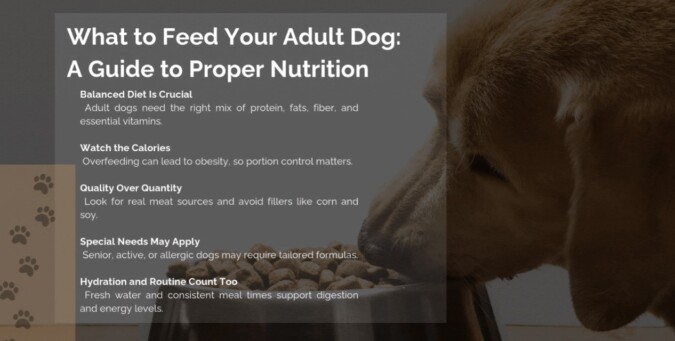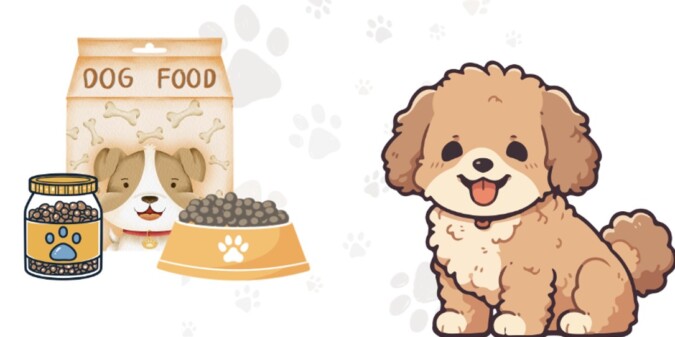Feeding your adult dog isn’t just about filling the bowl — it’s about supporting their energy, longevity, and overall health. Many pet owners unknowingly choose foods that fall short in delivering what a mature dog truly requires. Balanced nutrition means more than just protein; it involves fats, fiber, vitamins, and minerals in the right proportions. Poor diet choices can lead to dull coats, digestive issues, and even chronic diseases. To keep your canine companion healthy and vibrant, understanding the core of adult dog nutrition is essential. This article dives deep into what your pet actually needs and how you can meet those needs naturally and effectively. Let’s explore how to feed your adult dog like a pro — with clarity, care, and science-backed facts. Because when you know better, you feed better.

Why Proper Nutrition for Adult Dogs Matters
Your dog’s adult years set the stage for how well they age. This life phase, usually from 1 to 7 years depending on the breed, demands consistent, high-quality nutrition to fuel activity, maintain muscle mass, and support immune function. Just like with people, what dogs eat daily plays a direct role in their energy levels, mood, and resistance to illness. Unlike puppies or senior dogs, adults need a carefully balanced diet tailored to their stable metabolism and physical output. You can’t just feed them leftovers or pick a bag off the shelf without reading the label. Choosing smart, nutritionally sound food is an investment in years of happy tail-wagging. Dogs rely entirely on their owners to make these dietary choices — don’t let them down. A great diet today can prevent costly health problems tomorrow.

The Importance of Ingredient Quality
Not all dog foods are created equal — and many commercial options contain fillers, artificial preservatives, or low-quality meat by-products. That’s why ingredient quality is a non-negotiable priority. One of the most reliable ways to ensure your pet is getting optimal nutrition is to look for holistic dog food, a premium option that focuses on whole, natural ingredients – https://masterzoo.ua/ru/catalog/sobaki/korm-dlya-sobak/korm-dlya-sobak-kholistik-klasu/.
This type of dog food uses real meat, wholesome vegetables, and natural supplements to provide complete nourishment without unnecessary additives. Holistic dog food supports full-body wellness by enhancing digestion, joint health, skin condition, and immune defense. Holistic brands also avoid common allergens and use ingredients you can actually recognize on the label. Switching to high-quality ingredients isn’t just trendy — it’s the foundation of your dog’s wellness routine. What you feed your dog should be as clean and honest as what you feed yourself. If it’s not good enough for a human, why should it be good enough for your best friend? Look for foods that meet AAFCO’s nutrient profiles for adult dogs to ensure balanced, regulated formulations.


Essential Nutrients Every Adult Dog Needs
Every adult dog needs a specific set of nutrients to thrive — and no, not all kibble covers the full checklist. The five core nutritional pillars include proteins, fats, carbohydrates, vitamins, and minerals. When these are balanced properly, your dog benefits from strong muscles, shiny fur, solid digestion, and a robust immune system. Nutritional gaps may lead to sluggishness, brittle coats, poor appetite, or even organ damage over time. Investing in a nutrient-dense diet now prevents a host of problems later. Here’s a closer look at the key nutrients:
- High-quality protein – Supports muscle maintenance and overall body repair.
- Healthy fats – Provide energy and promote brain and skin health.
- Complex carbohydrates – Offer slow-releasing energy and digestive support.
- Essential vitamins – Boost immunity and cell repair.
- Trace minerals – Strengthen bones, teeth, and metabolic function.
Always read labels to ensure you’re not missing any of these essentials. If your dog is particularly active or has a medical condition, these needs might shift slightly, so regular vet consultations are key.

Common Mistakes in Feeding Adult Dogs
Many dog owners, even with the best intentions, make dietary mistakes that can hurt their pet’s health over time. From overfeeding to offering harmful table scraps, small daily errors can add up. Understanding what to avoid is just as crucial as knowing what to feed. Most mistakes come from misinformation or simply not realizing the long-term consequences. Here are the top five mistakes to watch out for:
- Feeding only low-cost commercial food – These often lack nutrients and contain fillers.
- Ignoring portion control – Leads to obesity, which strains joints and organs.
- Using too many treats – Adds empty calories and disrupts appetite.
- Skipping vet-recommended diets – Especially important for dogs with allergies or conditions.
- Feeding raw or undercooked food without guidance – Can expose pets to bacteria and parasites.
Fixing these habits early on can significantly increase your dog’s lifespan and comfort. Feeding isn’t just a chore — it’s a daily commitment to your pet’s health. Being mindful about what goes into your dog’s bowl is the ultimate form of responsible ownership. And if you’re unsure, always consult a canine nutritionist or your vet to avoid unnecessary guesswork. According to the Association for Pet Obesity Prevention, an estimated 59% of dogs in the U.S. were classified as overweight or obese in 2022.

Your adult dog deserves more than just an average meal — they need intentional, nutrient-rich food tailored to their life stage. From understanding the difference high-quality ingredients make to avoiding common feeding mistakes, it’s clear that proper nutrition is key to a longer, happier life. Make sure their diet includes essential proteins, fats, and vitamins, and don’t underestimate the power of real, whole foods. Whether you choose dry kibble, wet food, or holistic dog food, consistency and quality always matter most. Feeding is more than a routine — it’s your dog’s foundation for strength, energy, and well-being.





